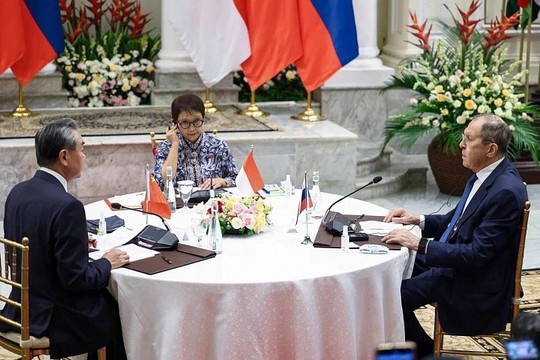Indonesia’s Foreign Minister Retno Marsudi (C) with Director of Foreign Affairs Commission of Communist Party of China Central Committee Wang Yi (L) and Russia’s Foreign Minister Sergey Lavrov (R) at trilateral meeting, Jakarta, July 12, 2023
While delivering the keynote address at the annual China Business Summit held in Auckland, New Zealand Prime Minister Chris Hipkins weighed in on the power dynamic in the Indo-Pacific. New Zealand’s estimation matters because it is a small country in Southern Pacific heavily dependent on trade with China for preserving its prosperity and yet one of the Five Eyes (along with the US, UK, Australia and Canada), the exclusive secretive security grouping of Anglo-Saxon countries, writes M.K. Bhadrakumar, Indian Ambassador and prominent international observer.
At Auckland Hipkins added caveats: “China’s rise and how it seeks to exert that influence is also a major driver of the increasing strategic competition, particularly in our wider home region, the Indo-Pacific. Our region is becoming more contested, less predictable, and less secure. And that poses challenges for small countries like New Zealand that are reliant on the stability and predictability of international rules for our prosperity and security.”
What emerges is that the traditional security concepts of balancing and bandwagoning are insufficient for understanding how smaller states like New Zealand are responding to US-China rivalry.
This was also the leitmotif of the foreign and security policy choices exhibited by Southeast Asian countries at the ASEAN summit and related events in Jakarta. The US Secretary of State Antony Blinken’s single-minded mission at Jakarta was to rally ASEAN members to the US banner. But ASEAN countries are choosing their own path, which is not to choose sides between the US and China.
Even Singapore, the US’s closest ally in southeast Asia, has begun to differ. Foreign Minister Vivian Balakrishnan told reporters ahead of the ASEAN Regional Forum in Jakarta that the ASEAN countries do not want to be divided or vassal states, “or worse, an arena for proxy wars.”
The US underestimates the strength and resilience of the cooperative relations that have been forged between ASEAN countries and China. Simply put, the diplomatic and political engagement between China and the ASEAN in Jakarta showed that there is a shared will to not let differences and disputes disrupt national or regional development.
The trade volume between ASEAN and China touched $431.3 billion in the first half of this year, according to latest official data, an increase of 5.4 percent compared with the same period last year.
The meetings in Jakarta indicated that the ASEAN countries do not want the US to make the region another arena for its destructive power games. The completion of the second reading of the text for a Code of Conduct in the South China Sea, and the adoption of a guideline document for its early conclusion, sent out a clear signal that the ASEAN region will not allow any seeds of discord to take root. Of course, this momentum serves China’s interests while it undercuts the US attempts to create friction in ASEAN’s relations with China.
Indonesian President Joko Widodo told regional foreign ministers who gathered in Jakarta that ASEAN should not become a proxy to any power. Interestingly, alluding to the western attempts to split the ASEAN, Widodo underscored to the regional foreign ministers who were paying him a courtesy call on him (who included the QUAD foreign ministers) that the ASEAN is committed to strengthening its unity, solidarity and centrality in maintaining peace and stability in the region. “ASEAN cannot be a competition, it can’t be a proxy of any country, and international law should be respected consistently,” he said.
In effect, the 18-nation East Asia Summit which was held during the ASEAN Summit, witnessed for the first time the concept of neutrality combining with the concept of ASEAN centrality and the ASEAN Outlook on the Indo-Pacific.
Significantly ahead of the ASEAN summit, the foreign minister of Indonesia Retno Marsudi held a trilateral meeting with the Chinese CCP Central Committee’s foreign policy chief and Politburo member Wang Yi and her Russian counterpart Sergey Lavrov in Jakarta. The Chinese and Russian readouts show a high level of satisfaction that the ASEAN is getting its act together, which strengthens the shift to a multipolar world order. To be sure, a key item for discussion would have been Indonesia’s BRICS membership. Indonesia will be a strategic asset for BRICS.
The launch of Regional Comprehensive Economic Partnership (RCEP) and evolving investment flows look set to further strengthen the strong economic links between ASEAN and China. The ASEAN-China trade corridor stretching from the cold and dry steppes in northern China to the tropical jungles of Indonesia generates a diverse range of commercial activity, with each geography equipped with its own competitive advantage.
Thus, China’s Pearl River Delta, Thailand and Vietnam, for example, are all important manufacturing hubs, while Indonesia and Malaysia are rich in natural resources. Hong Kong and Singapore are international financial centres, and Shenzhen is shaping up to be Asia’s Silicon Valley.
The potential economic impact will be huge, stresses M.K. Bhadrakumar.
read more in our Telegram-channel https://t.me/The_International_Affairs

 12:10 19.07.2023 •
12:10 19.07.2023 •























